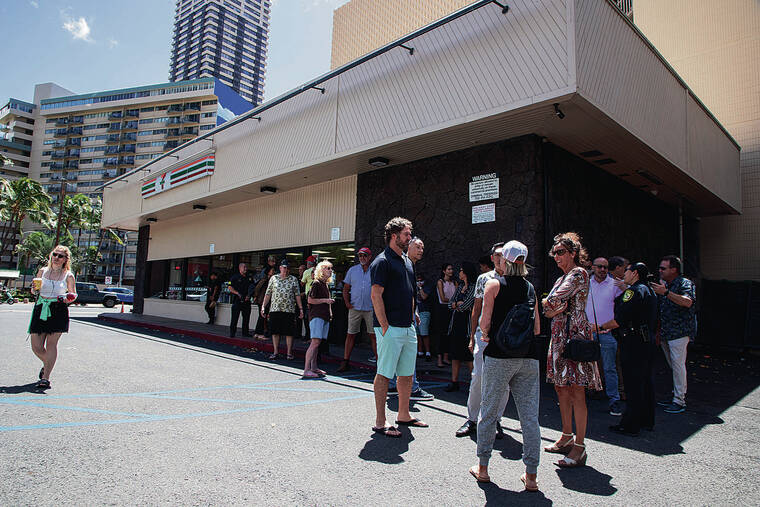
Mahalo for supporting Honolulu Star-Advertiser. Enjoy this free story!
A new crime-reduction program called “Safe and Sound Waikiki” is kicking off in the neighborhood where a rash of high-profile violent crimes, including a recent sword attack at a Kalakaua Avenue 7-Eleven, has sharpened community concerns.
Honolulu Prosecuting Attorney Steve Alm said the multiagency program is based on the already established “Weed and Seed” program, which seeks to “weed out” criminals from a particular district and then “seed” communities by investing in social and economic revitalization.
However, Alm said Safe and Sound will have its own funding and will operate separately from Weed and Seed, which began scaling up its Chinatown and Kalihi-Palama program in July 2021 and added Pearl City/Waipahu on July 1 and Ewa Beach on Monday.
Alm said the Waikiki program, which has upward of $350,000 in seed funding from the city and private sources, will include the Honolulu Police Department’s District 6, which runs from the yacht harbor to the mauka side of the Ala Wai Canal as well as Diamond Head.
He said Waikiki stakeholders are meeting regularly and working to hire a Safe and Sound site coordinator for the program, which is expected to start law enforcement and social services efforts in a couple of months.
Alm said: “Safety is on people’s minds. Crime really was down during the pandemic. It has ticked up again. But the fact of the matter is that people just feel less safe.
“We are going to do whatever we can with HPD, working together to make Waikiki as safe as we can.”
That can’t happen fast enough for the Waikiki community, as evidenced by the crowd of about 30 residents who met with state-elected officials, members of the Waikiki Neighborhood Board and Honolulu police on Tuesday at the 7-Eleven at 1901 Kalakaua Ave., site of a violent sword attack June 22.
The gathering was an opportunity for the Waikiki community to update officials on their concerns about crime in advance of Safe and Sound, emphasizing the urgency of improving safety in their neighborhood.
It was attended by HPD’s Waikiki team, including its commander, Maj. Randy Platt; state Rep. Adrian Tam (D, Waikiki-Ala Moana-
Kakaako); state Sen. Sharon Moriwaki (D, Kakaako-
McCully-Waikiki); Jillian Anderson, the Republican candidate for State House District 24; Waikiki Neighborhood Board members; representatives from nearby condominiums; and Waikiki residents and workers.
Crime in Waikiki tends to wax and wane, with some spots more prone to disturbances. This spring a shooting and several violent assaults near Kalakaua Avenue and Lewers Street were a top concern, prompting Hawaii Lodging &Tourism Association President and CEO Mufi Hannemann to lead the drive to get Alm to greenlight Safe and Sound Waikiki.
Stakeholders were already working on Safe and Sound Waikiki when a sword-
wielding 7-Eleven employee allegedly severed a man’s hand and lacerated his abdomen. The employee, Jason Walker, 46, has been charged with second-degree attempted murder, and his bail has been set at $1 million.
But Walker’s apprehension isn’t enough for Waikiki Neighborhood Board member Jeff Merz, who has been making and fielding complaints about criminal activity at the two 7-Eleven locations on Kalakaua Avenue.
“We need to take immediate action. Neighbors warned us about this over the past two years,” said Merz, who was originally pushing to have both locations closed but said he would back off if 7-Eleven increased security and closed the store earlier, as suggested by others in the neighborhood.
Glen Carner, who lives in the nearby Waikiki Landmark where he operates Family &Addiction Counseling LLC, wants 7-Eleven to close at 11 p.m., which he believes would decrease the likelihood of violent incidents.
“As a mental health professional, it was completely predictable that this would happen,” he said. “The windows here get broken about once a month. People gather here and drink and do drugs. The late-night, early-morning hours are a huge part of the problem.”
Tam said he worries that reduced business hours might create a void. Instead, he is considering legislation that would ban stores in Waikiki from selling miniature liquor bottles, like those on airlines, or at the very least promoting their sale.
“7-Eleven recently advertised that you could buy four of those minibottles for $4 — that’s like $1 a shot. That’s ridiculous,” Tam said.
7-Eleven Hawaii did not respond to the Honolulu Star-Advertiser or to the gathering.
Waikiki Neighborhood Board member Kathryn Henski said she informed 7-Eleven on Tuesday that members of the community were meeting in the parking lot. Henski said she asked for a manager to join the discussion, but was informed that a manager was not there and that employees could not get in touch with one.
“I was taken aback by the unresponsiveness,” Henski said.
Right after the group left 7-Eleven, a homeless man moved onto the sidewalk near the front door. More than an hour later, he was still sleeping there.
Kathleen Hayasaka said vagrancy is a near-daily problem at 7-Eleven at 1901 Kalakaua Ave., as well as the corner of Ala Moana Boulevard and Hobron Lane in front of the McDonald’s, the ABC Store and the bus stop. The parking lot behind the Ilikai and the culvert by Hilton Hawaiian Village along the Ala Wai Canal also are ongoing problems, she said.
“I used to feel safe walking through this neighborhood day or night. Now I rarely do,” she said.
Platt said prior to the sword attack, HPD had gotten mostly nuisance-type complaints at that 7-Eleven, including reports of people loitering, blocking doorways and arguing with store clerks. He said HPD also received complaints about people abusing substances at or near the location.
He said a reason that programs like Safe and Sound are important is that they help prevent nuisance complaints from escalating. Platt said police think the suspect and the victim in the sword attack were known to each other.
“I’m told that we are seeing good improvements in Chinatown from Weed and Seed,” he said.
Alm said those with information about crime hot spots and safety suggestions should send their feedback to Safe and Sound, which is collecting information at Waikikiconcerns@honolulu.gov.
Moriwaki, who spent several hours with Waikiki residents Tuesday, said many mentioned that reduced activity from vacant buildings and lots, and business disruptions, have made the neighborhood more vulnerable.
“The more vacancies, the more vagrancy,” Moriwaki said. “I’m going to look for ways to build up Waikiki and make it more active.”
Chad Snater, a real estate agent and member of the Pavilion at Waikiki board, said that during the earlier part of the pandemic, the condominium had to get power of attorney from the Waikiki Brewing Co. so that it could take legal action against trespassers while the business was closed.
“People would go onto the restaurant’s property and climb onto ours,” he said. “We had break-ins.”
Alm said teamwork is part of what has made Weed and Seed successful in Chinatown and Kalihi-
Palama. From July 12, 2021, to June 30, Alm said, the program netted 164 felony charges, 109 misdemeanors and 26 domestic violence misdemeanors. He said 204 homeless people were arrested for felonies, almost all of them drug possession.
Alm expects a higher volume of arrests for Safe and Sound, which covers a larger region and thus will have greater needs for housing and treatment options.
Cheryl Inouye, Alm’s senior adviser, who has worked for decades as a probation officer and supervisor, said the Department of the Prosecuting Attorney plans to expand its “Substance Use Disorder Assessment-Fast,” or SUDA-
Fast, program into Waikiki. The program, which is being used in Chinatown’s Weed and Seed, works to get people with substance abuse problems quickly assessed and into treatment before they are sentenced to probation.
“Probation officers are trained to look at risk factors, so the more risk factors someone has, the more likely they would be to reoffend,” Inouye said. “So if we can reduce the number of risk factors such as substance abuse (and) housing arrangements, then the greater the chances of success.”
Alm said officials also recognize that part of the reason that SUDA-Fast works is that “many of the chronically homeless are not amenable to voluntary efforts and will reject offers for help.”
However, many will make a different choice if the options are SUDA-Fast or jail, he said. About five people who were assessed for SUDA-
Fast as part of the Chinatown-Kalihi-Palama Weed and Seed still need beds, Alm said.
“SUDA-Fast has been a great collaboration, and we are trying to work out the bugs and get it running smoothly, as we know Waikiki will have a tremendous need for it,” he said.
Honolulu Council Chair Tommy Waters, who appropriated $250,000 for Safe and Sound Waikiki and supported increases to HPD’s budget, said he also advocated to place $5 million in the city budget to provide grants to, among other things, address inpatient services to address substance abuse and/or mental health issues.
Another million dollars in funding was added to expand stabilization facilities in partnership with the Honolulu Police Department and the state Department of Health that create a transition for severely mentally ill people and those with substance abuse issues to become stable and get into longer-term care, he said.
Waters said in addition to prioritizing public safety in the budget, he wants to work with the Prosecutor’s Office and courts to see that more of those convicted of misdemeanors are placed on probation.
“As a former public defender, I am keenly aware of the benefits of probation for repeat offenders and society. Probation provides an opportunity for drug testing, mental health assessments, and even job placement,” he said in an email. “My concern is that when these individuals are released without probation, they are allowed to go back and commit the same crimes over and over again, without oversight. Instead, it is my sincere hope that we can increase our use of probation to help these individuals get the support they need to reduce recidivism.”
Alm said probation generally needs to be stricter, and judges should agree to ban more probationers from returning to where they committed the crime. He said the Department of the Prosecuting Attorney asked for geographical restrictions in the vast majority of the 299 cases that were charged as part of the Chinatown-
Kalihi-Palama Weed and Seed, but only 29 of those requests were granted.
“It’s a problem now in Chinatown. It will be an even bigger problem in Waikiki,” Alm said.
The state Judiciary declined to comment.
Read More: World News | Entertainment News | Celeb News
Star Ads





